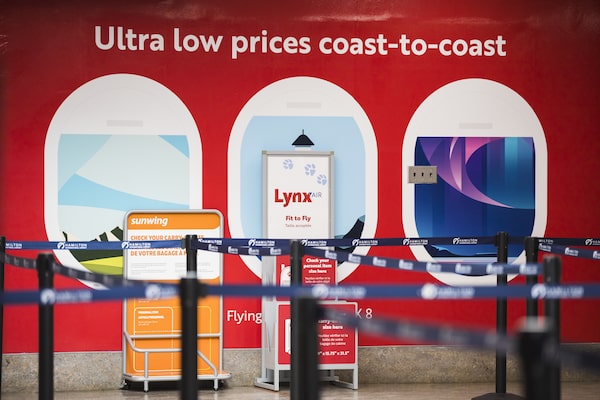
Lynx Air signage is displayed at the John C. Munro Hamilton International Airport in Hamilton, Ont., on Feb. 23.Nick Iwanyshyn/The Canadian Press
Lynx Air, which shut down on Sunday after receiving court protection from creditors, owes $25-million in taxes to the federal government and millions more to suppliers.
The overdue amounts owed, according to documents filed in an Edmonton court, include a total of $4-million for fees at airports in Toronto and Montreal and $4.5-million to Delta Airlines for plane maintenance, and $350,000 for de-icing aircraft in Calgary.
The discount carrier said in the filings it does not have the cash to repay the amounts owed to the suppliers, which had threatened to withdraw their services, seize aircraft and prevent the airline from landing at Toronto Pearson International Airport. This would cause a “chaotic and haphazard” end to the airline, Lynx said in documents filed in the Court of King’s Bench of Alberta, which last week gave Lynx creditor protection under the Companies’ Creditors Arrangement Act (CCAA).
Lynx also revealed it has been in takeover talks with rival discount airline Flair Airlines, and had reached a non-binding agreement in January. The unspecified proceeds from the sale to Flair were to go toward the $113-million debt owed to Indigo Partners, the 25-per-cent owner of Lynx controlled by discount airline mogul Bill Franke. Flair did not respond to e-mailed questions.
Lynx said it “urgently” needs protection from creditors so it can stabilize the business, “pursue and close a transaction which has been identified and negotiated by the applicants, or another transaction which may be identified through a sales process,” and wind down the business.
Companies that are granted protection under CCAA are given time to avoid bankruptcy and draft a plan that proposes to repay creditors, usually as a percentage on every dollar owed.
The $25-million Lynx owes to the Canada Revenue Agency is for taxes on imported aircraft. Under a payment plan outlined in the documents, Lynx was to pay $100,000 a month beginning last December, and $700,000 a month starting in April.
Pasher: Lynx Air blames everyone but itself for its demise
Lynx announced Thursday night it would halt all flights and cease operating by Sunday night, stranding passengers in such places as Cancun, Mexico, and Orlando. It also cancelled return flights on the weekend from Los Angeles, Las Vegas and Phoenix, according airport data.
As of Monday, all nine of its aircraft were parked at Calgary International Airport, according to FlightRadar24.com.
Lynx said last week customers should ask their credit-card companies for refunds. However, Canada’s passenger-protection rules say airlines that cancel flights must give refunds if they cannot offer alternatives. The regulator, the Canadian Transportation Agency (CTA), says those rules still apply. But the chances of getting money back from Lynx is “limited,” given the court process, said Jadrino Huot, a CTA spokesperson.
The CTA, which adjudicates service disputes between airlines and customers, has received 111 complaints about Lynx since the airline announced late Thursday it was halting flights, and 1,300 before that. It will not process these complaints until learning more about the creditor protection process, he said.
Lynx customers should contact their credit-card company, insurance provider or travel agent to see if they are eligible for a refund, the CTA says.
In court filings, Lynx blamed its failure on high airport fees, rising jet fuel prices, the grounding of the 737 Max in 2019-20 and the COVID-19 pandemic, all of which delayed its launch and drove up expenses.
Privately owned Lynx said it has liabilities of about $600-million, and assets worth $429-million. It lost $53-million in 2022, the year it launched with nine leased Boeing 737 Max aircraft. It employs 500 people, 390 of whom are in Alberta.
Flair, the Edmonton airline that has been in takeover talks with Lynx, is itself behind in its taxes. The Globe and Mail reported on Jan. 27 that Flair owes the government $67-million for import taxes on aircraft.
 Eric Atkins
Eric Atkins